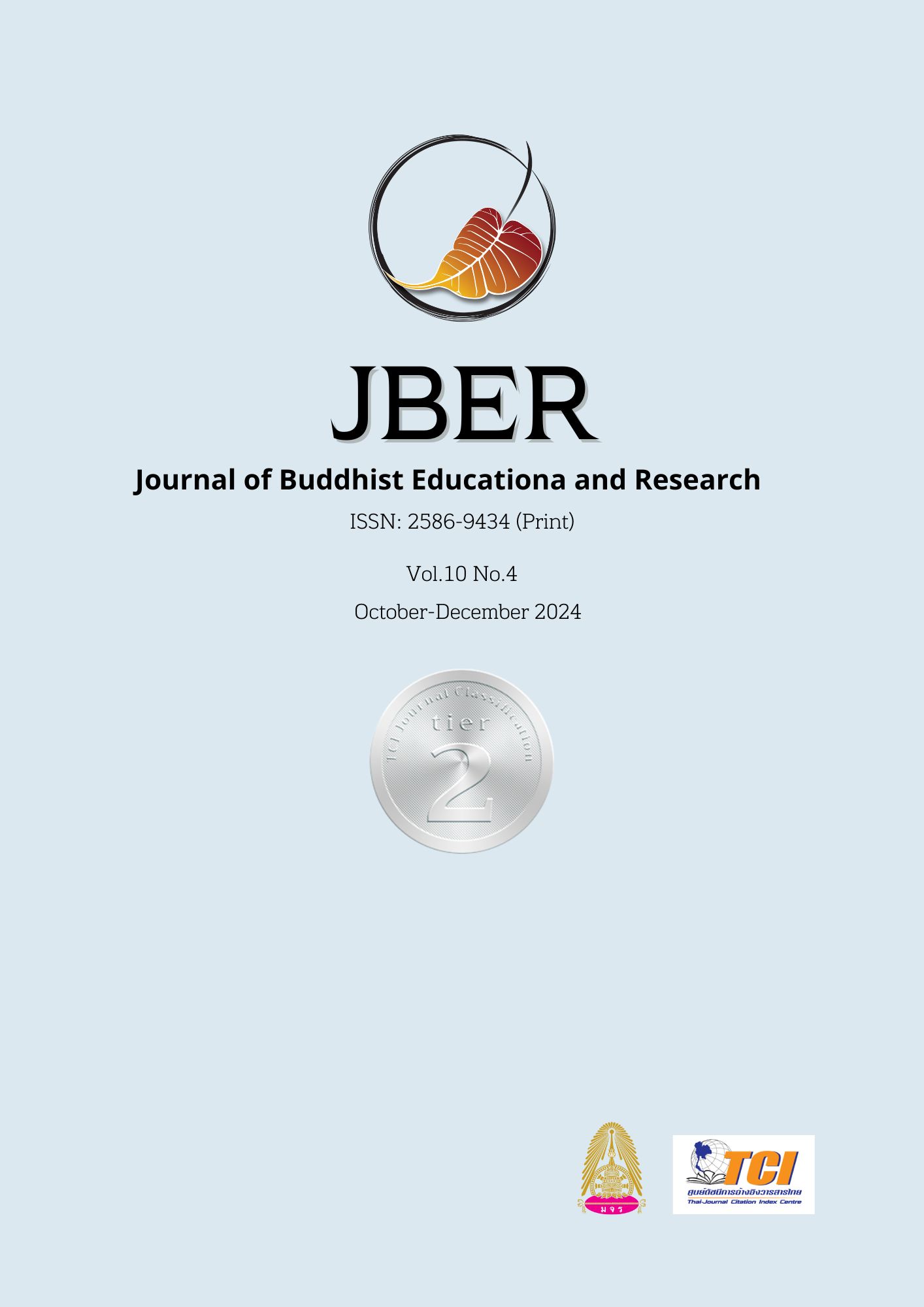The Development of Mathematical Skills in Early Childhood by Organizing Experiences with Question Level of Bloom's Taxonomy
Keywords:
Organizing Experiences, Question Level of Bloom's Taxonomy, Mathematical Skills, Early ChildhoodAbstract
This research aimed to: 1) develop early childhood mathematical skills through experiential learning combined with Bloom’s taxonomy questioning techniques, and 2) compare the mathematical skills of early childhood students before and after the implementation of these techniques. The sample consisted of 25 boys and girls aged 4–5 years, enrolled in Kindergarten 3 during the second semester of the 2024 academic year at the Demonstration School (Kindergarten Section), Chaiyaphum Rajabhat University, located in Na Fai Subdistrict, Mueang District, Chaiyaphum Province. The participants were selected using purposive sampling. Research instruments included an experiential learning plan incorporating Bloom’s taxonomy questioning techniques and an early childhood mathematics skills assessment form. The research followed a One-Group Pretest-Posttest Design, and data were analyzed using mean, standard deviation, and dependent t-tests. The findings revealed that experiential learning combined with Bloom’s taxonomy questioning techniques stimulated children's recall, understanding, application, analysis, and synthesis skills by integrating learning activities with everyday life. This approach encouraged children to explore solutions independently while gaining diverse experiences tailored to their individual readiness. The process emphasized learning through play, progressing from simple to complex concepts, thereby laying the foundation for mathematical skill development. The study concluded that early childhood students who participated in experiential learning with Bloom’s taxonomy questioning techniques demonstrated statistically significant improvement in mathematical skills at the .05 level.
References
เกศิณี ศิริสุนทรไพบูลย์. (2566). วิทยาการคำนวณกับการจัดประสบการณ์การเรียนรู้สำหรับเด็กปฐมวัย. วารสารนวัตกรรมสังคมและเทคโนโลยีสื่อสารมวลชน. 6(1), 72–80.
เพ็ญจันทร์ เงียบประเสริฐ. (2542). คณิตศาสตร์สำหรับเด็กปฐมวัย. คณะครุศาสตร์สถาบันราชภัฏภูเก็ต.
เยาวพา เดชะคุปต์. (2542). กิจกรรมสำหรับเด็กปฐมวัย. กรุงเทพฯ: เอพี กราฟฟิกส์ ดีไซน์.
กมลรัตน์ กมลสุทธิ. (2555). ทักษะพื้นฐานทางคณิตศาสตร์ของเด็กปฐมวัยที่ได้รับการจัดประสบการณ์ตามแนวมอนเตสซอรี่. ปริญญานิพนธ์ กศ.ม. (การศึกษาปฐมวัย). มหาวิทยาลัยศรีนครินทรวิโรฒ.
ชมนาด เชื้อสุวรรณทวี. (2542). การสอนคณิตศาสตร์. ภาควิชาหลักสูตรและการสอน มหาวิทยาลัยศรีนครินทรวิโรฒ.
ชมภูนุช ศรีสุข และคงศักดิ์ สังฆมานนท์. (2565). ผลการจัดประสบการณ์การเรียนรู้โดยใช้ชุดการสอนแบบบูรณาการทักษะพื้นฐานทางคณิตศาสตร์สำหรับเด็กปฐมวัย. วารสารศึกษาศาสตร์ มหาวิทยาลัยมหาสารคาม. 16(1), 25-37.
ธิดารัตน์ อธิปัญจพงศ์ และกรกมล วัสโป. (2566). การพัฒนาทักษะคณิตศาสตร์พื้นฐานสำหรับเด็กอนุบาลด้วยกิจกรรมเกมการศึกษาออนไลน์ Wordwall. วารสารพุทธสังคมวิทยาปริทรรศน์. 8(2), 145-158.
นิตยา ประพฤติกิจ. (2541). คณิตศาสตร์สำหรับเด็กปฐมวัย. กรุงเทพฯ: โอเดียนสโตร์.
บุญเยี่ยม จิตรดอน. (2539). หน่วยที่ 5 การจัดประสบการณ์เพื่อสร้างมโนคติทางคณิตศาสตร์: เอกสารการสอนชุดวิชาสร้างเสริมประสบการณ์ชีวิตระดับปฐมวัยศึกษา. (พิมพ์ครั้งที่ 4). กรุงเทพฯ: มหาวิทยาลัยสุโขทัยธรรมาธิราช.
วรนาท รักสกุลไทย. (2548). ไฮสโคป (High Scope) กับการพัฒนาเด็กปฐมวัยในรวมนวัตกรรมทฤษฎีการศึกษาปฐมวัยสู่การประยุกต์ใช้ในห้องเรียน. กรุงเทพฯ: สำนักพิมพ์สาราเด็ก.
วันดี ภู่สุวรรณ. (2559). การพัฒนาทักษะพื้นฐานคณิตศาสตร์ของเด็กปฐมวัย โรงเรียนอนุบาลเจริญวัยจังหวัดสมุทรปราการ โดยใช้กิจกรรมการเล่านิทานประกอบภาพ. ครุศาสตร์มหาบัณฑิต มหาวิทยาลัยราชภัฏธนบุรี.
สถาบันส่งเสริมการสอนวิทยาศาสตร์และเทคโนโลยี. (2563). กรอบการเรียนรู้และแนวทางการจัดประสบการณ์การเรียนรู้บูรณาการวิทยาศาสตร์ เทคโนโลยี และคณิตศาสตร์ในระดับปฐมวัยตามหลักสูตรการศึกษาปฐมวัย พุทธศักราช 2560. (พิมพ์ครั้งที่ 1). กรุงเทพฯ: บริษัท โกโกพริ้นท์.(ไทยแลนด์) จำกัด.
อุบล ผลจันทน์. (2566). การจัดกิจกรรมเกมการศึกษาเพื่อพัฒนาทักษะทางคณิตศาสตร์สาหรับเด็กปฐมวัยอายุ 3-4 ปี. วารสารมจรอุบลปริทรรศน์. มมร.วิทยาเขตอุบลราชธานี, 8(3), 1543-1550.
Bloom, B. S. (1956). Taxonomy of Educational Objectives, the Classification of Educational Goals–Handbook I: Cognitive Domain. New York: David Mac Kay Company, Inc.
Leanne, E. E., & Heather, J. B., (2017). How Do Parents Foster Young Children's Math Skills?. Child Development Perspectives, 12(1), 16-21.
Mayesky. (1998). Creative Activities for Young Children. United states of America: Delmar.
Taylor, B. J. (1985). A Child Goes Forth. (6th ed). Minnesota: Burgess Publishing Company.
Zener, R. S. (2007). Theory of Montessori. A.M.I Primary Training Course. Nakorn Pathom: NIDTEP.
Downloads
Published
How to Cite
Issue
Section
License
Copyright (c) 2024 Journal of Buddhist Education and Research (JBER)

This work is licensed under a Creative Commons Attribution-NonCommercial-NoDerivatives 4.0 International License.





